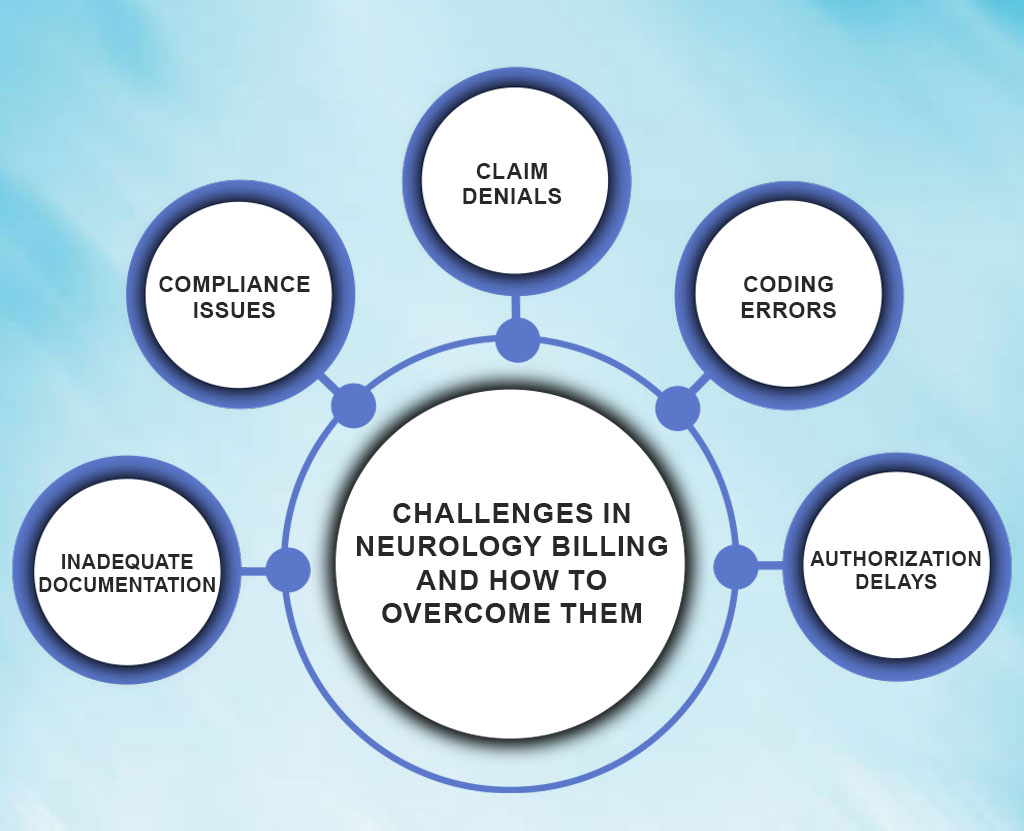Neurology practices must use correct billing and coding services to get paid quickly and correctly. For neurological tests, treatments, and evaluations, accurate recording is needed. About 30% of rejected medical claims are due to mistakes in the code, which costs clinics a lot of money.
Healthcare laws are always changing; wrong billing in all specialties costs $125 billion every year. Since neurology offices do a lot of complicated treatments, using proper neurology billing and coding services can keep you from getting denied and help you get more money back.
Neurology billing and coding that is done correctly helps offices stay financially healthy and run smoothly in today’s hectic medical field.
Understanding Neurology Billing and Coding Services
Neurology billing services involve submitting claims for neurological evaluations, diagnostic tests, and treatments provided by neurologists. These neurology billing and coding services ensure that claims follow healthcare rules and payor policies, which reduces the number of times insurance companies wait or reject claims.
Neurology coding needs to be correct so that all services are recorded, and the right diagnostic and procedure codes are used for treatments. Neurologists could get reimbursed late or not if they don’t use the right codes, which could put their finances at risk.
Coders take medical care and turn it into claims that can be billed. They also make sure that the claims meet insurance and government standards.
Key Neurology CPT Codes
CPT numbers are used to describe services in neurology billing. There are a lot of typical neurology CPT codes for exams, consultations, and surgeries.
Codes like 99203–99205 are for first exams, while 95907-95913 are for nerve conduction studies. Neurologists get paid the right amount when they bill for each job with the right neurology CPT codes.
If you miss a code or get it wrong, it could cost you money, legal problems, or compliance. So, neurology offices need to monitor changes to CPT codes and guidelines.
Place Code vs. Value Code in Neuroscience Billing
Neuroscience billing requires place and value codes for proper claims and payment. A place code indicates the service location. For billing, an outpatient clinic, hospital, or telemedicine environment that provides neurological care has a location code. Value codes, on the other hand, record invoicing details such as service prices. Value codes reflect therapy type, payer expenses, and patient services.
Key Differences Between Place Code and Value Code in Neuroscience Billing
What makes place codes and value codes different is what they represent. Value codes show how much funds or therapy is worth, while place codes show where the healthcare service is. When used correctly, these codes help ensure that claims for neuroscience services are correct and help with payment.
Insurance companies need place codes to check where the service happened and see if the patient’s plan covers it. If the patient gives an incorrect code, the claim could be denied. However, value numbers describe the patient’s treatment’s financial aspects, which affects how much the payer pays.
Best Practices for Using Place Codes and Value Codes in Neurology Billing
To maximize reimbursement and avoid claim denials, it is essential to follow best practices when using place and value codes in neuroscience billing:
Accuracy in Code Selection: Make sure the place code accurately depicts where the neurological service was provided (for example, clinic, hospital, or via telehealth). Similarly, regarding the cost of the treatment, the appropriate value codes for the services that come with the treatment must be provided.
Stay Updated: This should be done constantly and synchronously with potential changes in the code assignments since CMS or some other agency often revises healthcare codes.
Consult with Experts: In case of any uncertainty, consult the billing specialists or consultants who will assist in confirming the appropriate use of codes.
Applying these codes helps improve the claims process and, in turn, better reimbursement in the neurology billing and coding services.
ICD-10 Code for Functional Neurological Disorder
Commonly Used ICD-10 Codes for FND
Codes in ICD-10 help doctors identify Functional Neurological Disorder and figure out how much to charge for it. The ICD-10 number F44.4 is often used for FND because it covers Conversion Disorder with Motor Symptoms or Deficits.
Other codes can be used depending on the patient’s symptoms:
F44.5 for dissociative convulsions.
F44.6 for dissociative movement disorders.
Accurate ICD-10 coding is essential in ensuring that the patient’s condition is correctly identified and that healthcare providers are reimbursed for the services rendered.
Challenges in Neurology Billing and How to Overcome Them

Neurophysiology billing presents unique challenges due to the complexity of the specialty and the precision required in coding. Some common issues include:
- Claim Denials
- Coding Errors
- Authorization Delays
- Compliance Issues
- Inadequate Documentation
How To Overcome the Neulogy Billing Challenges
- Set up automatic billing systems to cut down on mistakes made by people and ensure that codes are correct.
- Staff members get training regularly to keep up with the latest changes to neurology coding.
- Do checks before billing to ensure that claims are complete, legal, and well-documented.
- Hire neurology billing experts with a lot of experience who know how to handle the specifics of neurological procedures and treatments.
- Track and manage pre-authorizations in a structured way to ensure permission processes run on time.
Conclusion
Neurology billing and coding require expertise to deal with denied claims, coding issues, and problems with following the rules. Correct and timely billing helps you get the most money back and avoid expensive fines. Neurology billing and coding services from experts help healthcare workers improve their cash flow, shorten the time it takes to get paid, and focus on patient care.
Get in touch with Resilient MBS right away for accurate, compliant, and quick neurology bills. Our neurology billing and coding services help you make more revenue and reduce mistakes and delays.
For more information or to set up a meeting, go to Resilient MBS Neurology Billing and Coding Services. Having a reliable neurology billing partner can help your business make more money.










